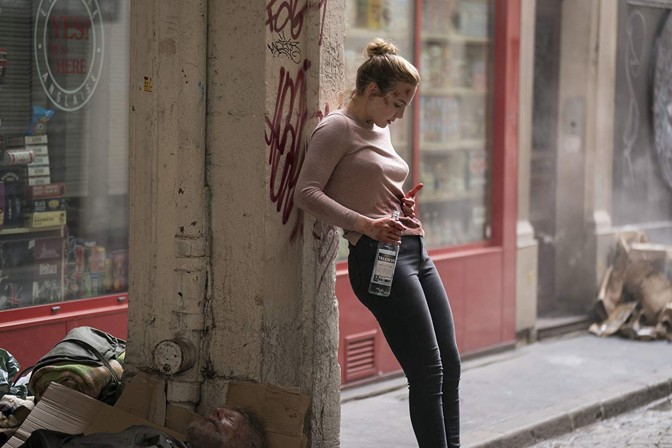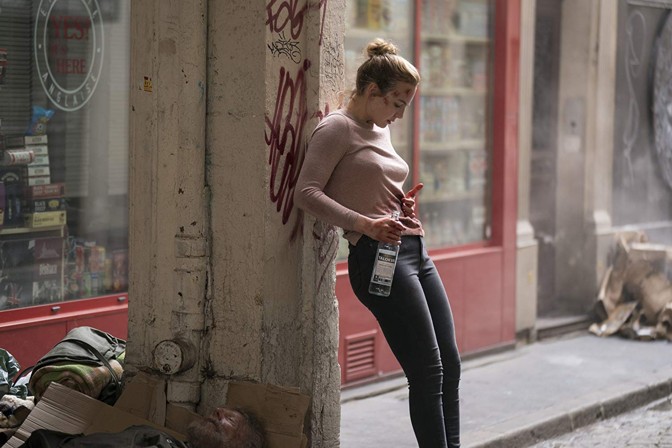
The U.S. Intelligence Community
Early in the first episode of Killing Eve’s second season, Eve (played by Sandra Oh), pallid and shaky after committing an unplanned act of violence, walks unthinkingly into a train station. She goes into a candy store, where she piles scoop after scoop of jelly beans and gumballs into a pink-and-white striped paper bag. The saleswoman raises an eyebrow at Eve’s wanton gluttony—the bag is full and yet she keeps adding more, until a pale blue marshmallow tumbles out and lands in front of a small boy. As he reaches out to take it, Eve pounces, slamming her hand down upon his as her face transforms, just for a second, into a snarl.
The moment evokes the first-ever scene in Killing Eve, when the feline, malevolent assassin Villanelle (Jodie Comer) tipped ice cream onto a little girl in a Vienna gelateria. The subtext is striking: The show is insinuating that Eve, whether she wants to or not, is getting closer to her antagonist, the woman whom she hunted for several episodes, the woman who stabbed her mentor to death—and the woman whom Eve in turn knifed in the stomach at the end of Season 1. Eve isn’t just pursuing Villanelle, the show suggests; she’s also absorbing her.
The secret of Killing Eve is that its macabre sense of humor and spy-story subversions are ornamental compared with the series’s grist: the strange, transformative pull the two main characters have on each other. Their unmistakably female dynamic vastly outbounds the “We’re not so different, you and I” synergy of other cat-and-mouse criminology dramas. Before Eve stabbed Villanelle, she first demolished her Paris walkup, smashing champagne bottles and ripping clothes into shreds. Then she confessed to Villanelle that she couldn’t stop thinking about her, and lay down next to her on Villanelle’s bed, as the air between them seemed to thicken. Finally, Eve stabbed Villanelle, an act of aggression that was loaded with sexual symbolism and tension. Their relationship, more uncanny than unconventional, is what made Killing Eve one of BBC America’s biggest hits.

The only problem with the show, which heads into Season 2 on Sunday night, is the paradox Eve and Villanelle now present. Comer’s extravagant charisma as Villanelle, her unsettling charm, is balanced by Oh’s comic awkwardness and perma-panic as Eve. You cannot, at this point, imagine one without the other, and yet a television series can’t just repeat the cycle of its original season over and over. If Eve and Villanelle stalk each other in perpetuity, intermittently meeting to kiss or maim, or both, Killing Eve will handcuff its own narrative potential. But to exile either character is equally unthinkable. So what now?
At least from the limited episodes made available for review, Killing Eve has struck a compromise between change and more of the same. Phoebe Waller-Bridge—the twisted, cherubic, filthy genius behind Fleabag who created Killing Eve and spearheaded its first season—has stepped away, but she’s anointed her friend, the actor and writer Emerald Fennell, in her stead. Fennell, who once wrote a short story for children about cannibalism, and who’s playing Camilla Parker Bowles in the upcoming third season of The Crown, feels about as fitting an heir to Waller-Bridge’s demented-patrician sensibility as anyone could imagine. From the first two episodes, which Fennell wrote, she choreographs Killing Eve’s pas de deux between light and dark with audacity. (In one scene, Villanelle tells a child who’s been in a car accident that his face “looks like a pizza.” In another, Eve responds to her feelings of trauma by striking up a lengthy conversation with a telemarketer selling double-pane windows.)
The second season is different from the first, though, because Eve is different. She fears she might be a murderer. She’s become momentarily engulfed by a sexualized encounter with a psychopath, someone who seems to kill more for sport than for professional validation. In the first episode, Oh plays Eve as mostly numb, with flashes of exuberance and despair. Villanelle, meanwhile, is the same as she ever was (the series pulls a fiendish trick early on that hints she might be developing a sense of empathy, only to brutally punish you for being taken in). Circumstances, though, have made Villanelle vulnerable. Forced to flee her home, and leave behind her armor of couture clothes and elaborate disguises—not to mention her actual weapons—Villanelle also has an incapacitating abdominal wound (“It’s really gooey,” she says, with grim pride) and no handler to help her.
The new episodes reverberate with a sense of humor that’s absurd, bleak, and distinctly British. (If a grown man ever offers you a “hotty-botty,” Killing Eve emphasizes, run.) Where title cards once announced the glamorous locations Villanelle frequented (Berlin, Paris, Rome), now they trumpet her arrival in the unlovely English town of Basildon. She spends a good amount of time in the first two episodes wearing boy’s superhero pajamas that are comically small. Fennell finds unspoken ways to enhance our understanding of who Villanelle is: The assassin has no problem throwing herself in front of a car to get medical attention, but she physically recoils in a later scene when the only shoes available to her are a pair of yellowing, plastic hospital Crocs. Danger doesn’t trouble her; ugliness does.
Eve, though, is more of a question mark. It’s unclear at this point how her encounter with Villanelle has changed her, or what her motivations might be going forward. Previously, her relationship with her husband, Niko (Owen McDonnell), was a small additive to the show but a healthy one; now, Eve seems like she could easily descend into the annals of dramatic heroines with dysfunctional personal lives. She’s still exceptionally intuitive, which makes her an excellent criminal profiler, and though the show only gestures at explaining how she’s back in her old job, the investigative scenes allow Oh moments of pure comedy. Staring at a graying, scarred corpse in a morgue, Eve suddenly exclaims that she’s craving a hamburger. “That’s the formaldehyde,” the pathologist says, cheerily. “The smell of the bodies makes you crave meat.” Killing Eve, wherever it might go from here, is just as contradictory—however gruesome or morbid it is, you tend to hunger for it, fiercely, just the same.

 Ethicoin: Securing the Post-COVID-19 Future
Ethicoin: Securing the Post-COVID-19 Future  A Proclamation on National Crime Victims’ Rights, 2024
A Proclamation on National Crime Victims’ Rights, 2024 
